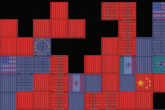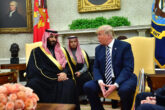July 16, 2020
How Iran’s Oil Infrastructure Gambit Could Imperil the Strait of Hormuz
A series of mysterious and seemingly random explosions continue to erupt across various parts of Iran this month, hitting sensitive military sites, as well as populated residential neighborhoods. Recent reporting suggests that these explosions may be part of a larger campaign undertaken by the United States and Israel to scale back the regime’s military and nuclear capabilities. Iran has been slow in its response, playing the long game. But the risk of escalation — unintentional or otherwise — looms large. And as the events of 2019 showed, the Persian Gulf and the Strait of Hormuz would be key areas where Iran might set its sights for an asymmetric response.
Iran may be signaling its calculus is changing.
For decades, Iran has threatened repeatedly to obstruct naval traffic and disrupt the global energy market in the Strait of Hormuz. These threats had rung hollow for the most part — until now. Since the 1980s, such an extreme escalation from Iran amounted to a double-edged sword that also would prevent the country from using the strait for its own commercial lifeline. To take steps to close the strait would rattle Iran’s few remaining partners, chiefly China, whose energy needs are tied to freedom of navigation in the region and whose support the regime desperately needs to offset the effect of U.S. sanctions over the last 15 years.
Read the full article in War on the Rocks.
More from CNAS
-
In Dire Straits?
In a joint report from CNAS and Center on Global Energy Policy at Columbia University SIPA, Ilan Goldenberg, Jessica Schwed, and Kaleigh Thomas assess what would happen to the...
By Ilan Goldenberg, Kaleigh Thomas & Jessica Schwed
-
Game Over?
The trade wargame suggests that sustained high tariffs could create leverage and urgency to spur action toward a productive restructuring of the international trade system....
By Emily Kilcrease & Geoffrey Gertz
-
Middle East Security / Energy, Economics & Security
Trump Inks $600 Bn Deal In Saudi Arabia | Musk, Blackrock CEO Flank Trump In Gulf VisitIn today's episode of India Global, U.S. President Donald Trump secured a $600 billion commitment from Saudi Arabia on Tuesday to invest in the United States. NDTV's Gaurie Dw...
By Daniel Silverberg
-
Energy, Economics & Security / Technology & National Security
Tariffs and Tech: An Uncertain RecipeHigher tariffs could prompt American cloud companies to shift more of their capital investments abroad....
By Pablo Chavez




